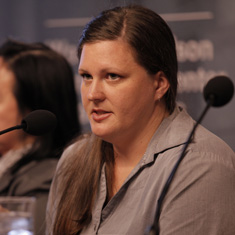-
Leslie Mwinnyaa: Young People Drive Integrated Development in Ghana’s Ellembelle District

“I have been amazed and inspired by the youth that I’ve worked with, with their dedication and motivation to help their countrymen and to try to make their communities better places,” says Leslie Mwinnyaa in this week’s podcast.
When Mwinnyaa arrived in the Ellembelle district of coastal Ghana as a Peace Corps volunteer she found a multitude of development challenges. Fishermen routinely use illegal techniques like chemicals, lights, and dynamite that decimate fish stocks; “sand winning” and mangrove clearing increases erosion, leaving communities vulnerable to flooding and reducing breeding grounds for local fish; poor waste and refuse management contributes to disease and poor health; and teenage girls have twice the national rate of pregnancy.
“I have been amazed and inspired by the youth that I’ve worked with, with their dedication and motivation to help their countrymen and to try to make their communities better places,” says Leslie Mwinnyaa in this week’s podcast.
When Mwinnyaa arrived in the Ellembelle district of coastal Ghana as a Peace Corps volunteer she found a multitude of development challenges. Fishermen routinely use illegal techniques like chemicals, lights, and dynamite that decimate fish stocks; “sand winning” and mangrove clearing increases erosion, leaving communities vulnerable to flooding and reducing breeding grounds for local fish; poor waste and refuse management contributes to disease and poor health; and teenage girls have twice the national rate of pregnancy.
To address these connected issues she enlisted the help of the BALANCED Project, an NGO based out of the University of Rhode Island’s Coastal Resources Center, and reached out to local partners, including a local nursing school, to develop an integrated population, health, and environment (PHE) program. The resulting Hen Mpoano, or “our coast,” project trains young nursing students to be advocates for reproductive health (especially for other young people), natural resource management, and sanitation. Hen Mpoano has established clubs in four high schools and 26 junior high schools.
“Communities have continued to express their appreciation for the PHE project. It has really been a vehicle for outreach programs at the community level,” Mwinnyaa says. “It has opened the door for communication about illegal fishing, sand winning, reproductive health, and environmental sanitation.”
Mwinnyaa spoke at the Wilson Center on April 30 as part of a conversation about youth and PHE.
Friday podcasts are also available for download from iTunes.
Topics: Africa, Beat on the Ground, community-based, cooperation, development, education, environment, environmental health, family planning, flooding, food security, forests, Friday Podcasts, gender, Ghana, global health, HIV/AIDS, natural resources, oceans, PHE, podcast, population, sanitation, water, youth
 A Publication of the Stimson Center.
A Publication of the Stimson Center.



